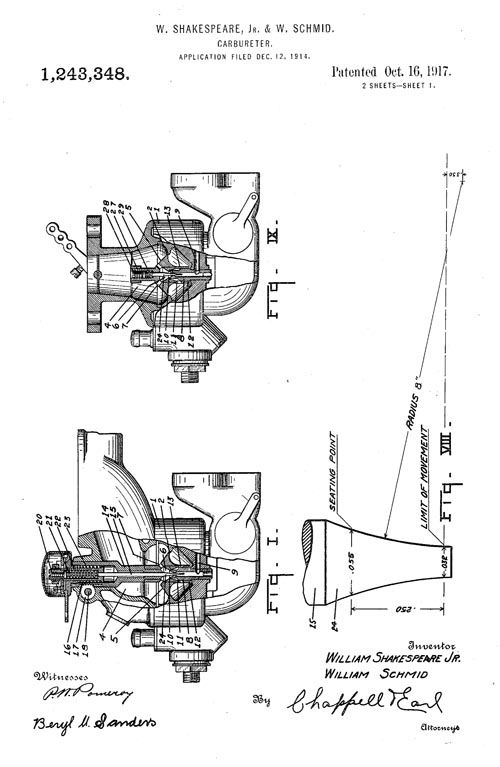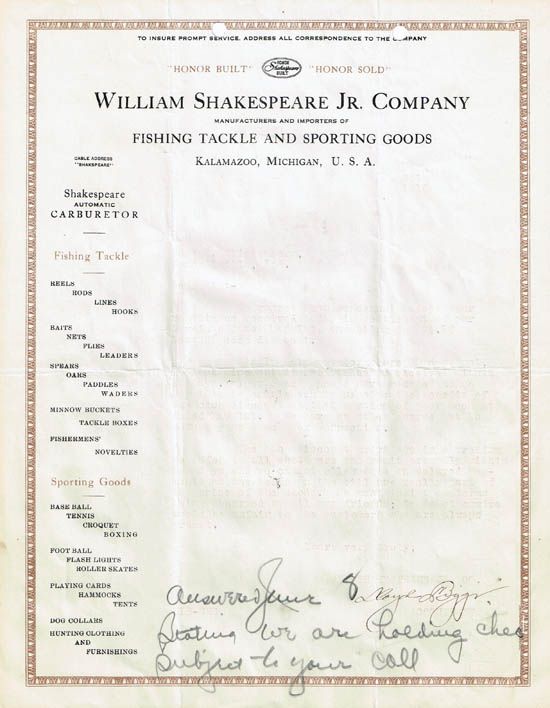I thought I'd give a bit more history on the Carbo-Meter. At the 1913 Detroit Auto Show, the Shakespeare Carbo-Meter was unveiled. The January 30, 1913 Motor World magazine was there, and described it as thus:
The accessory exhibits, though more than a third of the total number, occupy a small amount of space; nevertheless, there are several decidedly interesting new things shown that did not adorn the New York show lists. Chief of these is the Carbo-Meter, which is a carburetor of novel construction representing three years' study and work by William Shakespeare, Jr., the Kalamazoo (Mich.) manufacturer of "Honor Built" fishing tackle and other sporting goods.
William Shakespeare, Jr. himself even gave a presentation entitled "A New Form of Carbo-Meter" on March 6th, 1913 at the Michigan State University.
Shakespeare even spent a goodly amount of time promoting his new engine part. The magazine The Horseless Age reported on Dec. 30, 1914 that:
Wm. Shakespeare Jr. Co. will show the Carbo-Meter, a carburetor in which the centrally located combined throttle and air valve is the only moving part. The primary air inlet and gasoline nozzle are in the middle of this valve, and additional air is admitted around the periphery.
As late as 1917 (according to an Oct. 6, 1917 Automobile Topics article), Shakespeare was an active member of the Motors & Accessory Manufacturers association (M.A.M.) and gearing up to display at the fall New York Auto Show.
He was granted Patent #1,243,348 on Oct. 16, 1917 (filed on Dec. 12, 1914) for his Carbo-Meter. The patent was jointly granted to William Schmid and Shakespeare, and assigned to the Shakespeare Co. Schmid was one of Shakespeare's most brilliant engineers and responsible for at least a dozen of Shakespeare's fishing reel patents between 1912 and 1930.

The timing could not have been worse to launch a new automobile enterprise. America's entry into the world war occurred right around the time the patent was granted for the Carbo-Meter, and it appears to have disappeared by 1920. Still, it is telling of the mechanical genius of Shakespeare (and Schmid) that they developed so much buzz in a car world literally awash in new developments.
-- Dr. Todd
ADDENDUM: I was just reading Eric Foster Jeska's (Wm. Shakespeare's grandson) history of Shakespeare, and he notes that one of the products that Shakespeare made during World War II was carburetors.
ADDENDUM II: Rich Ludwig sent in this incredibly cool 1910s era Shakespeare letterhead. Check out the Carburetor advertised on the top left. Also note the other goods they carried. What a diverse company! Thanks, Rich!

1 comment:
I fish with Shakespeare combos. Can't say I have had any problem out of any of them. Good topic.
Post a Comment